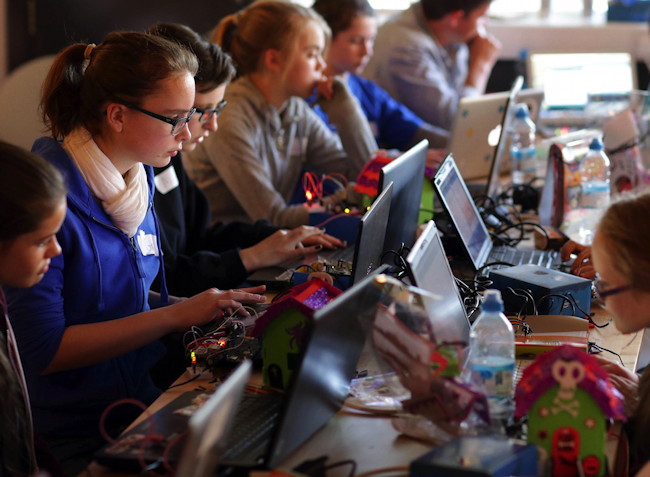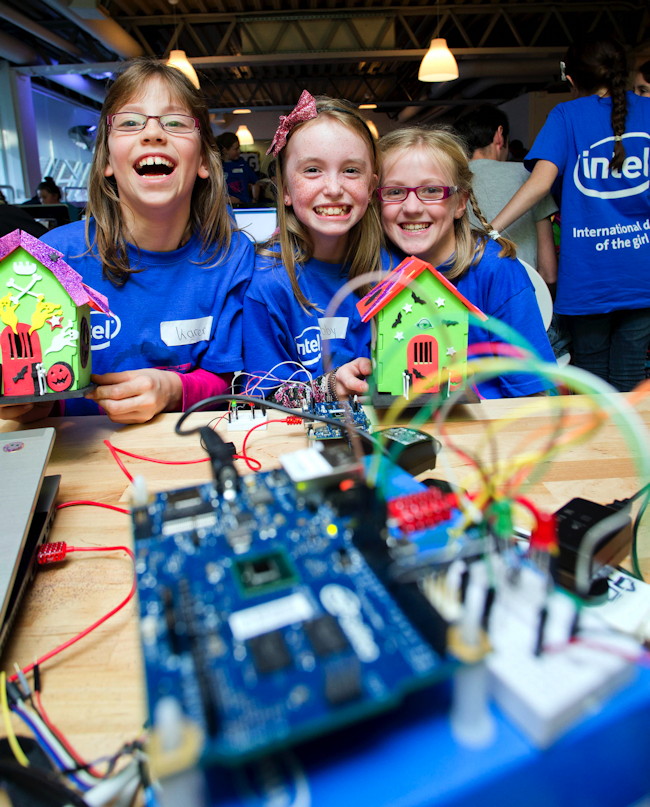Ciara Whelan (8) works on a Guzman Box at the Galileo Girls event hosted by Intel, CoderDojoDCU and TOG at Dublin City University on Saturday. Photo by Marc O'Sullivan
The Galileo Girls event, to mark International Day of the Girl Child on Saturday, introduced around 70 girl hackers to the internet of things at Dublin City University (DCU).
Flashing lights, buzzers, robots, cables and lots and lots of felt material – that can mean only one thing: there’s a hackathon going on.
And so there was. On 11 October, around 70 girl hackers gathered in DCU for the Galileo Girl event, where they spent a day learning how to bring technology to life using the Intel Galileo.
Within a few hours of taking the maker boards out of the boxes and connecting them to laptops, the room was awash with creations, including Hallowe’en decorations festooned with flashing LEDs, robots and lights that sparked into action if people tweeted using the #GalileoGirls hashtag.
This was the first ever Galileo Girls event, according to Sarah Sexton from Intel, which teamed up with CoderDojoDCU and Dublin hackerspace group TOG to run the day.
Intel provided the hardware, and Sexton explained to the young makers that the Galileo boards were designed in Ireland.
“We have been making chips in Ireland for about 25 years, but this board was designed here, too,” she says.
The Galileo Girls organisers were blown away by the level of interest in the hacking day, according to CoderDojoDCU and CoderDojoGirls mentor Sarah Doran.
“This event attracted three times the number of girls we would usually have in CoderDojoDCU on a Saturday,” she says. “And many had never been to CoderDojo before, particularly girls in the 15-18 age group.”
Internet of things
The girls learned about how devices can ‘talk’ to each other and what this means for the internet of things, which is an emerging paradigm in technology, explains Niambh Scullion, who also mentors CoderDojoDCU and CoderDojoGirls.
“The internet of things is being enabled by cloud computing and more and more devices connecting to the cloud and sharing information,” she says.
“This could mean real-time monitoring of machine systems and knowing in advance when a part of a machine may need replacement. Or it could enable a fridge at home to communicate with your bin and draw up a shopping list for you every week. In this world technology is adapting and responding to your personal needs.”

Girls concentrate on coding at the Galileo Girls event at Dublin City University on Saturday to coincide with International Day of the Girl Child. Photo by Marc O’Sullivan
Creativity central
To get going on the Galileo, the participants learned how to make an LED on the board flash, then they opted to work in one of three streams to make robotic, social or wearable creations.
Alan Donnelly from CoderDojoDCU led the robotics group, which made spooky Hallowe’en decorations that lit up, moved and buzzed with the help of the Galileo.
Robert Fitzsimons from TOG cut a dash in a LED-illuminated waistcoat and led the wearables group, which used Lilypad Arduinos to make Hallowe’en costumes that lit up eerily.
And Noel King from CoderDojoDCU explained how to use JavaScript to control the Galileo and they worked on making a LED on the Galileo light up every time someone tweeted using the hashtag #GalileoGirls.

Nine-year-olds Karen Waters, Libby Brennan and Leah Wilson show off their Hallowe’en creations at the Galileo Girls event at Dublin City University on Saturday. Photo by Marc O’Sullivan
Getting to grips with the fun of tech and teamwork
“Our goal was to create a fun day for the girls, provide the tools and let their imagination and creativity shine,” says Doran. “I think the team achieved more than that: we’ve shown girls are interested and it’s so important that we (the IT community in Ireland) organise events to attract girls of all ages. Once they have passionate role models showing them the fun and interesting side of tech, they will naturally progress into IT careers.”
CoderDojo CEO Mary Moloney commented on how well the young makers worked together.
“The group of 70 girls included some first timers and some more experienced coders, they all learned something new and left feeling proud and energised by what they’d achieved through the day,” she says. “It’s great seeing how girls at different levels help each other and work together in teams.”
DCU president Prof Brian MacCraith visited Galileo Girls and was impressed with the level of creativity he saw.
“Today’s event was a very important way of marking the International Day of the Girl Child by introducing our smart young women to one of the next big developments in technology – the internet of things,” he told Siliconrepublic.com. “In order to promote STEM careers for women it’s important that we engage them and enable them to express their creativity. Initiatives such as today’s event represent a great way of doing that, and DCU is delighted to support it.”
Women Invent Tomorrow is Silicon Republic’s campaign to champion the role of women in science, technology, engineering and maths. It has been running since March 2013, and is kindly supported by Accenture Ireland, Intel, the Irish Research Council, ESB, Twitter, CoderDojo and Science Foundation Ireland.
Prof Brian MacCraith will be a panelist our Innovation Ireland Forum on 24 October in the Guinness Storehouse, Dublin